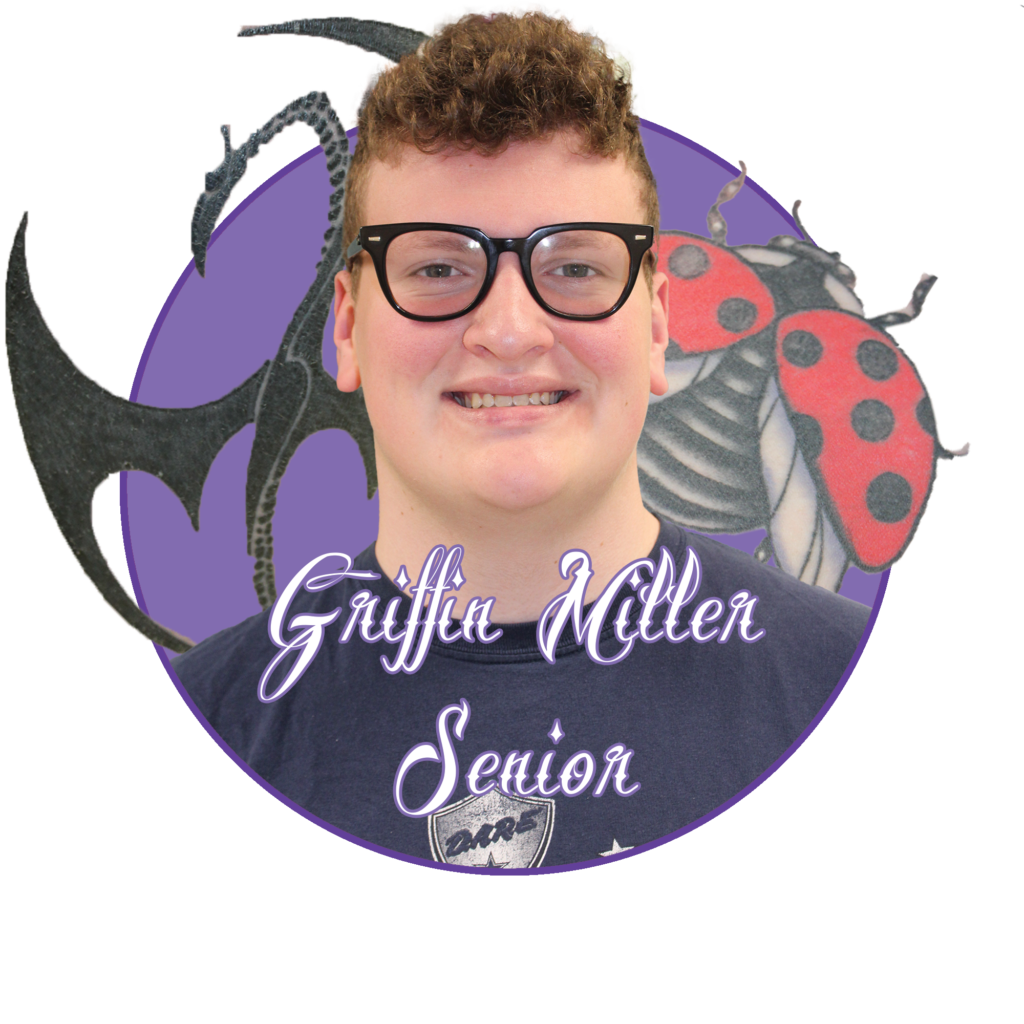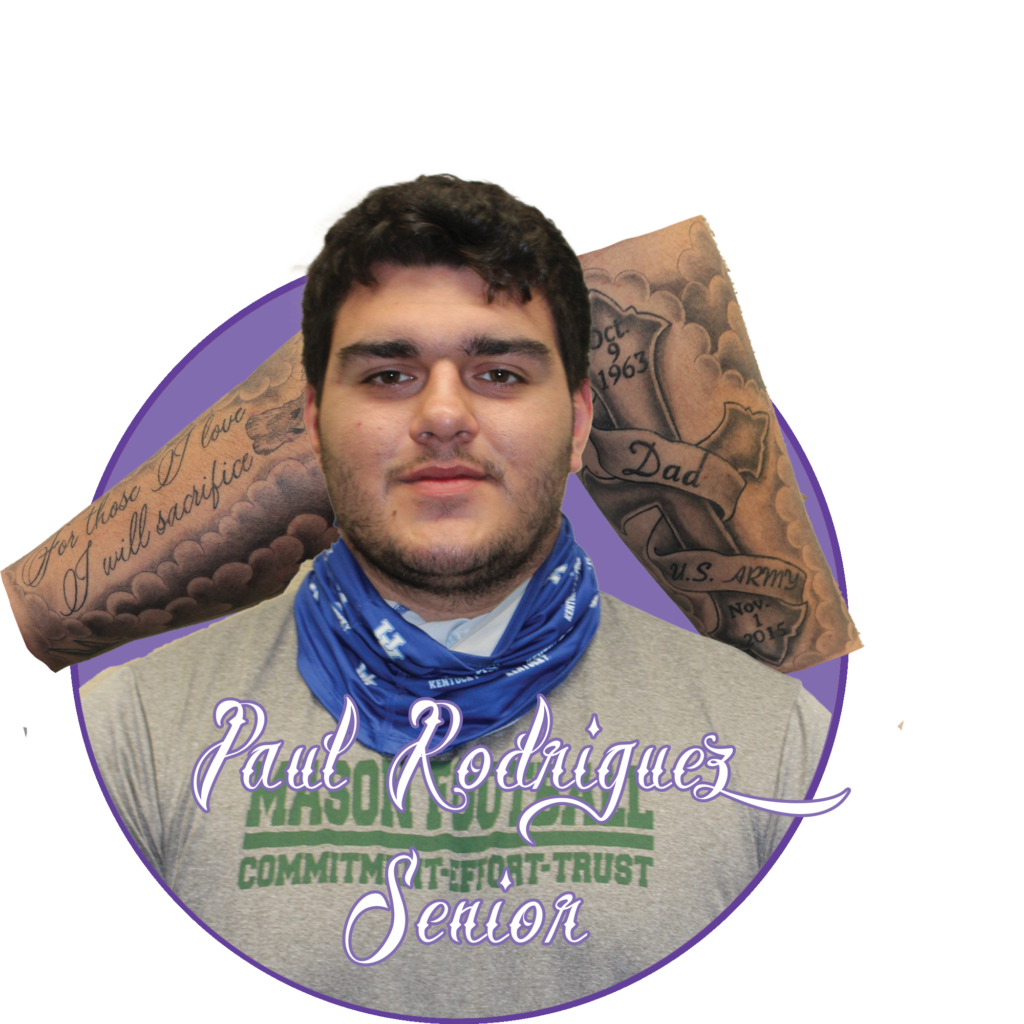Students honor and connect with loved ones through tattoos
Ally Guo | Staff Writer
The permanent nature of a tattoo is often viewed as a risk, but for some students, that permanency is the perfect way to memorialize a treasured family connection.
People get tattoos for a variety of reasons: to express a certain aesthetic, to represent ideas important to them, or to celebrate the people who inspire them. For several students at Mason High School, tattoos allow them to immortalize family members and personal values in a form that is individual and everlasting.

According to senior Paul Rodriguez, his first tattoo is a way for him and his brother to commemorate their father, who passed away several years ago. The tattoo is of a cross located on his inner left forearm, with the word “Dad” inscribed across it, as well as the words “U.S. ARMY,” paying tribute to his father’s service in the military.
“My dad passed away and my brother ended up getting that tattoo,” Rodriguez said. “After [about] a year he had it, I was like, ‘Okay, I want that, too. It means something to my family and my brothers.’ So I ended up getting the same exact tattoo in the same exact spot for my dad.”
On the other side of his forearm, Rodriguez’s second tattoo depicts an open-winged dove alongside the phrase “For those I love I will sacrifice.”
“I love my family and we’ve been through a lot together, so I decided to put ‘For those I love I will sacrifice,’” Rodriguez said. “The dove, [it’s] because we’re kind of religious. I was talking to my mom and we [felt] like that was a perfect kind of thing to put right there.”
Similarly, senior Griffin Miller’s tattoos also represent values shared within his family. One of his two tattoos is a dragon on his leg in honor of his father. Although it is not the exact same design, Miller’s father also has a dragon tattoo in the same spot, commemorating his time serving in the United States Navy onboard the USS Hué City, which has a dragon on its emblem.
“I wanted something similar to what my dad had because if it was important enough for him to tattoo on his body, it was obviously important enough for me to get something similar,” Miller said.

Miller’s second tattoo, a ladybug over his heart, commemorates his grandfather, who was an entomologist, a scientist who studies insects. According to Miller, the ladybug was his grandfather’s favorite insect, and when he passed away, it became a “symbol for him within [his] family.” He got it tattooed so that he would always have a “little bit of [his grandfather] with [him].”
Senior Katie Wahl said her tattoo was also an important part of honoring her late mother, who passed away when she was very young, but also served as a way for her to discover more about who her mother was. Located on her thigh, the tattoo is of carnation, which was both her mother’s favorite flower and is often considered a symbol of love.
“[My mother] passed away when I was a lot younger, so I don’t remember her that much,” Wahl said. “I recently started to learn more about her because my family doesn’t talk about her much because my stepmom has been like my mother figure [for] as long as I can remember. I learned that [the] carnation was [my mother’s] favorite flower.”
For senior Dharma Patel, her tattoo, a spelled out version of Om in Hindi on her forearm, is a way for her to connect with multiple members of her family. According to Patel, in Hindu tradition, Om is a mantra and sound that represents the Universe and the Ultimate Reality, symbolizing peace, tranquility, and unity and serving as a reminder to people to “slow down and breathe.”
“Both my grandmothers had the [Om] tattoo and so when my sister and I wanted a tattoo, that just seemed like the right one,” Patel said.

With this important family connection to Om, Patel, her mother, and her younger sister all decided to get the same tattoo together on her sister’s sixteenth birthday. Although the tattoo itself serves as a physical reminder of her family, Patel said she also valued the shared experience as a “moment for [them] that [she’ll] always be able to remember.”
“The tattoos that I get or that I would get would all mean something to me, and so it’s a moment that I can cherish forever,” Patel said.
Although Rodriguez, Miller, and Patel said their families were supportive of their tattoos, Wahl said that when she was younger, her parents were sort of against tattoos, which led her to believe they were not a good thing to have. However, as she has grown older and gotten her own tattoo, she now views them as a “nice way to express yourself.”
Rodriguez said that his mindset has shifted in a similar way over time. In the past, if he saw a person with many tattoos, he might have viewed them as strange, but as he started thinking more about it, he realized that tattoos “[tell] a story” and that “you can learn a lot from someone’s tattoos,” which led him to love the idea of tattoos.
In his own case, Rodriguez said that reactions to his tattoos have been positive and that he doesn’t mind sharing the story behind it.
“People have come up to me when I first got [my tattoo], and they go, ‘Oh, so cool! When did you get it? What does it mean?’” Rodriguez said. “[My tattoo] means something to me, so to inform other people what that tattoo means, I feel like it’s fine. People just really like the ideas of tattoos.”
According to Miller, although his overall view of tattoos has been about the same for most of his life, he has recently begun developing a greater appreciation for people who get tattoos mostly for artistic or aesthetic reasons.
“For a long time, I thought everybody should have tattoos with personal meaning to them,” Miller said. “But just being around people who [have a lot of tattoos], you start to gain an appreciation for people who simply like modifying their body and having that art that’s maybe not necessarily full of meaning but definitely is interesting to look at.”

Patel said she thinks the overall shift in public perception of tattoos can largely be attributed to this redefinition of tattoos as an artform rather than a sign of something bad.
Miller said he believes the change in opinion is due to the cultural mindset of the country as a whole beginning to emphasize choice and individualism over collectivism, with “things that celebrate individuality, like tattoos or piercings, or anything else that [affects] your individuality [in] a sense [of] how other people observe you” becoming more commonplace.
Currently, Rodriguez, Miller, Wahl, and Patel have all expressed the desire to get more tattoos in the future. Rodriguez is thinking of getting the American flag and both his mother’s and his father’s military ranks tattooed on his inner bicep. Miller plans to commemorate his mother and his sister, with considerations for a white rose on his back shoulder for his mother, as he often gifts those flowers to her. Wahl does not have anything specific in mind at the moment, but Patel wants to get a tattoo for her grandmother or her family as a whole.
Although Miller said he encourages others to get a tattoo if they really want it, he says it is also important to remember that they are permanent and to put careful consideration behind the decision.
“You have to ask yourself the all important question: am I okay with having this design on my body for the rest of my life?” Miller said. “Am I okay with possibly answering questions from people who ask about it? If you’re okay with their reaction to it or if that’s not important to you, then by all means, do what you want, but I think it is important to remember that you’re doing something that is very much for the rest of your life.”
Rodriguez also said that he recommends consulting with family and friends before getting a tattoo but that the final decision should depend solely on the individual.
“If it means something to you that much, then I say go for it,” Rodriguez said. “Nobody should judge you for something that you’re trying to get. It’s 2021. I say do whatever you want to do.”
